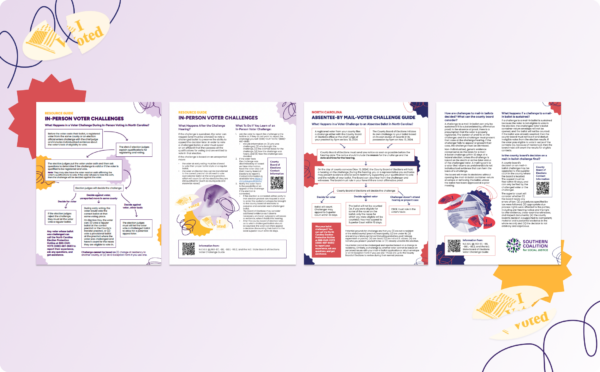VOTING RIGHTS
What Happens During a Voter Challenge in North Carolina?
North Carolina’s election process allows individuals to challenge the validity of others’ ballots — but only in very limited circumstances.
Anyone whose vote is challenged should call or text the nonpartisan Election Protection hotline at (888)-OUR-VOTE / (888) 687-8683 for help.
Southern Coalition for Social Justice (SCSJ) is focused on protecting people’s right to vote and is closely monitoring the use of voter challenges in the 2024 General Election. Our team of expert voting and civil rights attorneys have developed materials to explain the challenge processes in North Carolina, and your rights as a voter. Please review the flow-charts below for more detailed explanations, in addition to our overview here.
We know it may be upsetting to have the validity of your vote challenged. SCSJ understands that and is committed to ensuring that every eligible voter can cast a ballot and have that vote counted.
As a reminder, to vote in North Carolina, a person must be:
- A U.S. citizen;
- 18 or older by Election Day;
- A resident of the county where you’re registering to vote for at least 30 days before Election Day;
- Not actively serving a felony sentence, including probation, post-release supervision, or parole. Check your ability to vote here.
Mass voter challenges are a calculated strategy by election denial groups to undermine the election process and intimidate voters, especially people of color and those from historically marginalized communities.
In North Carolina, only a registered voter within the same county or an election official can challenge a vote if they believe the person lives outside the county or voting precinct, is not eligible to vote, or is not who they say they are.
The person making the challenge MUST have reliable evidence and first-hand knowledge or observations of an issue. Without that, the challenge should be dismissed and your vote will count.
Election officials may choose to conduct a hearing, which could be held immediately at the polling site in the case of in-person challenges or at another time.
Please attend the hearing to make sure your vote is counted. You may be asked questions about your voting eligibility or asked to show documents such as a government ID (driver’s license or school ID) or piece of mail sent to your address.
Don't be bullied. If you believe your vote should count, tell them so! That's often all it will take.
If you feel the challenge was discriminatory or based on false information, call your County Board of Elections to report it. Contact information is available here.
Please contact the nonpartisan Election Protection hotline for help from trained voting rights experts at:
- English: 1-888-OUR-VOTE (888-687-8683)
- Spanish/English: 1-888-VE-Y-VOTA (888-839-8682)
- Arabic/English: 1-844-YallaUS (844-925-5287)
- Asian Languages/English: 1-888-API-VOTE (888-274-8683)
Available Languages: Chinese, Korean, Vietnamese, Bengali, Urdu/Hindi, Tagalog
If you want to speak directly to an attorney, email Jeff Loperfido, SCSJ’s Chief Counsel of Voting Rights, at jeffloperfido@scsj.org. A response may be delayed, however, during election season and going through the Election Protection hotline may be a timelier way get the help, including legal support, you need.

